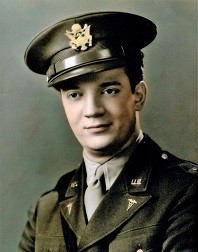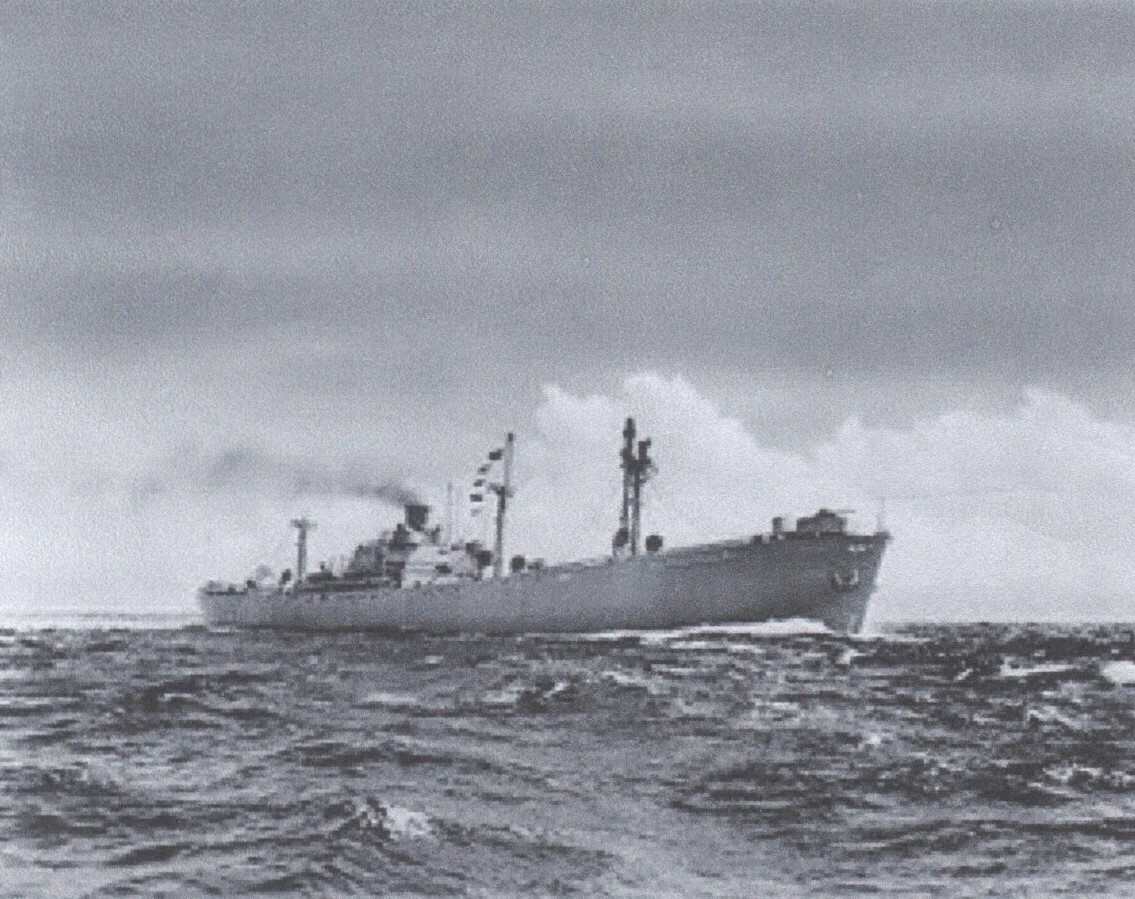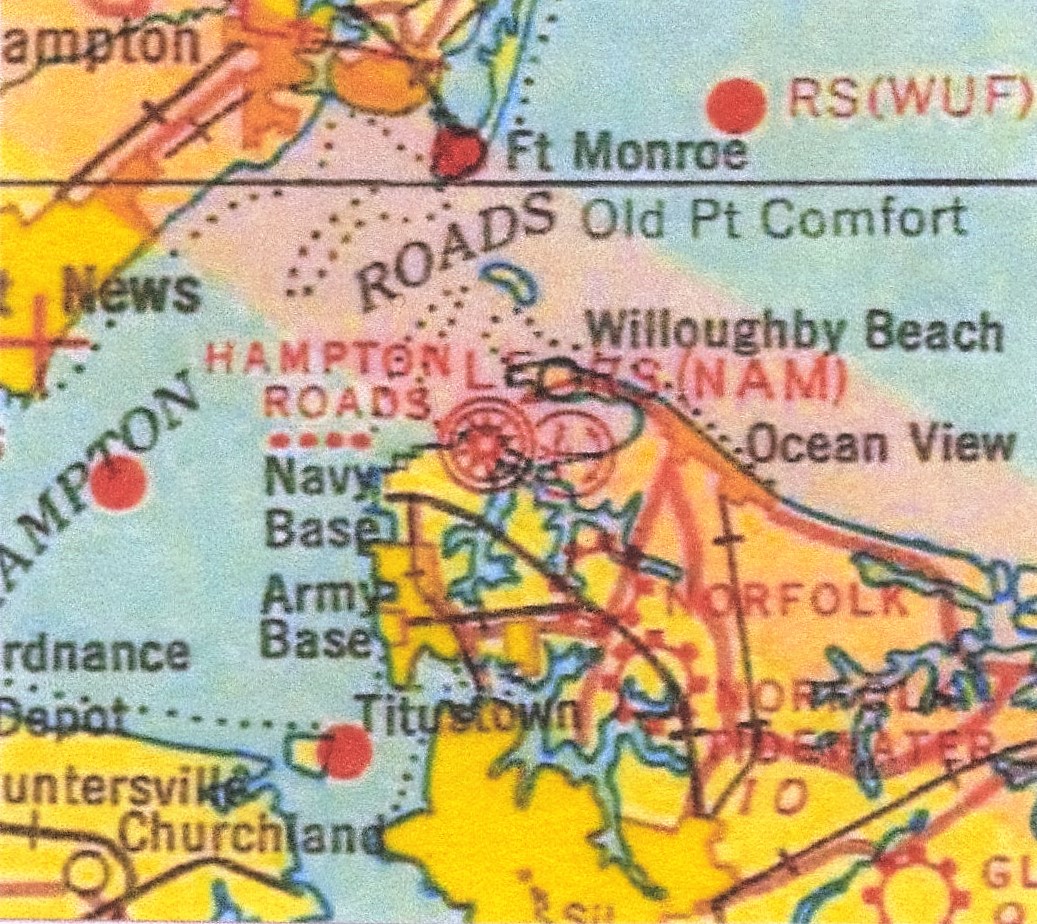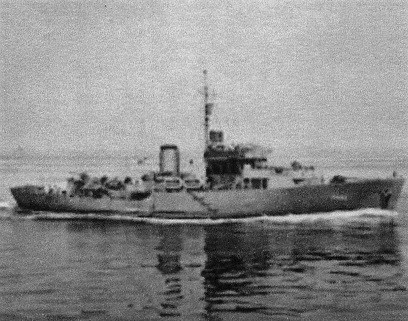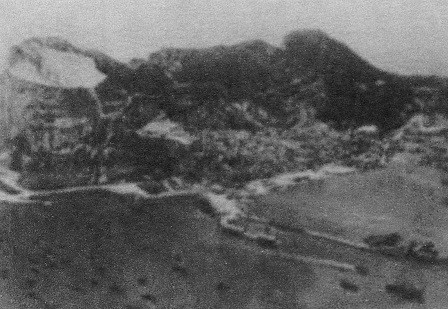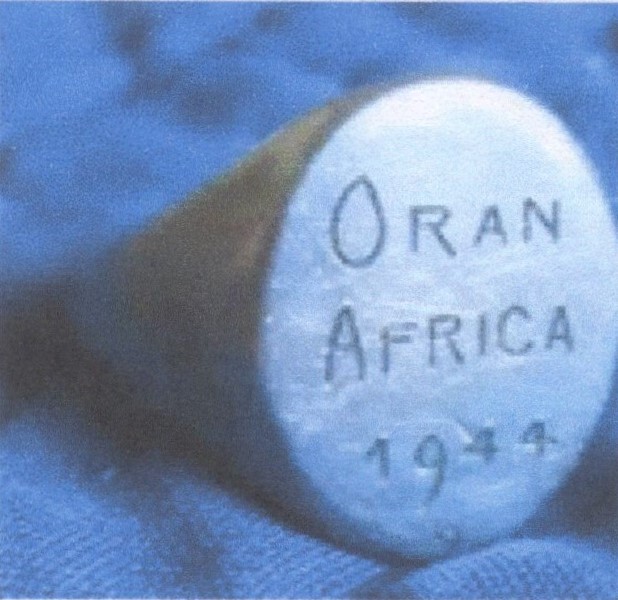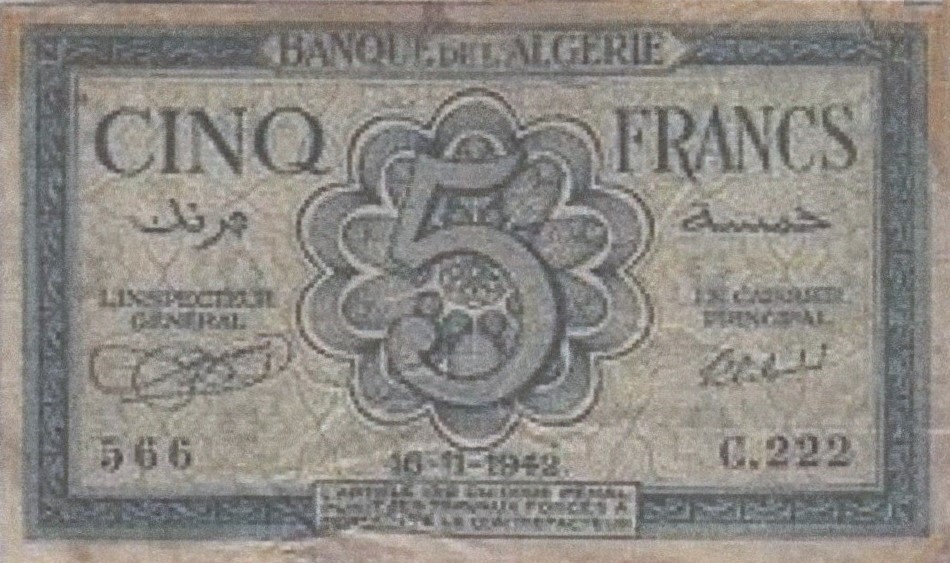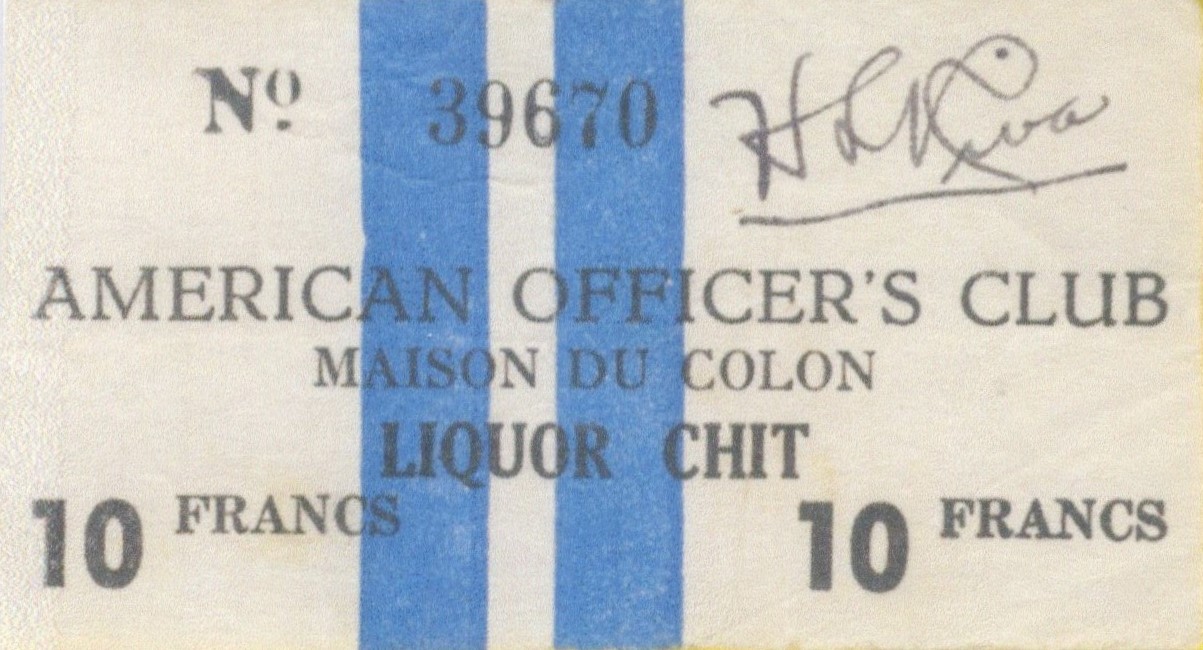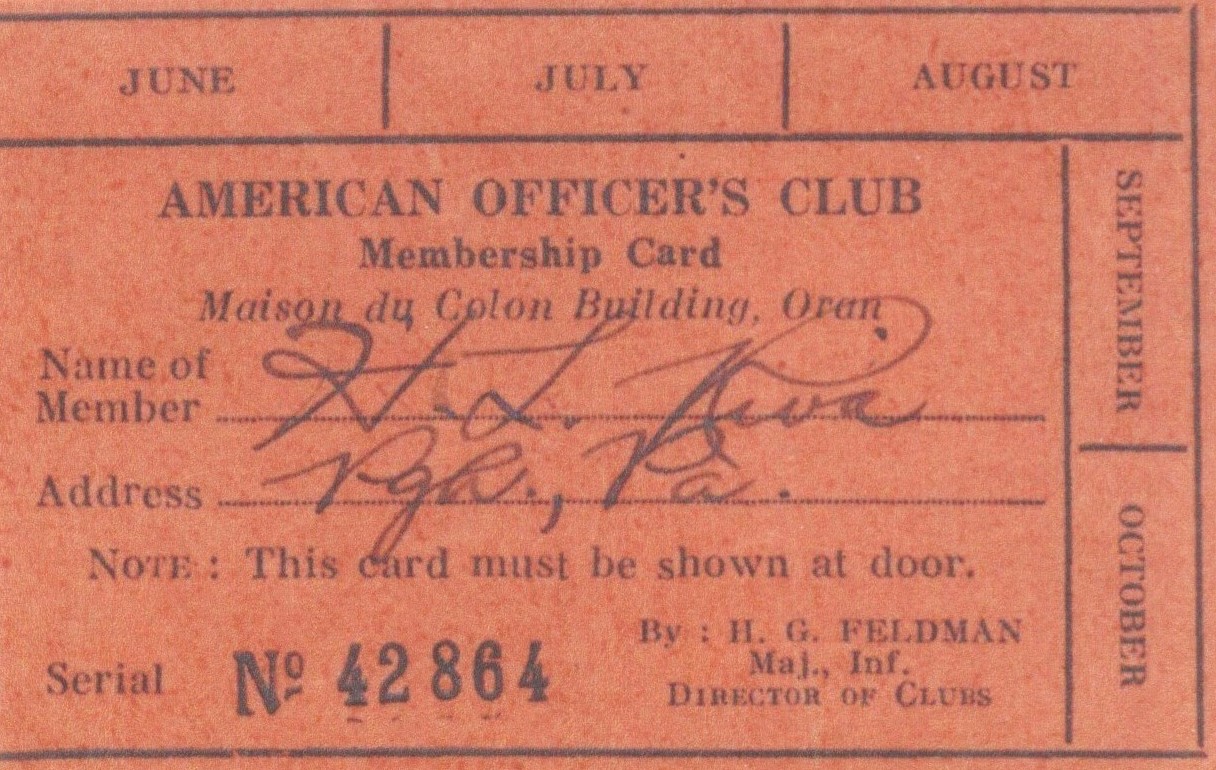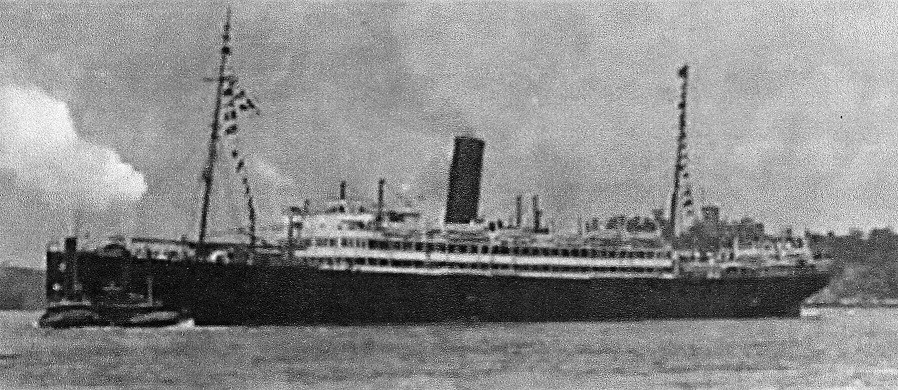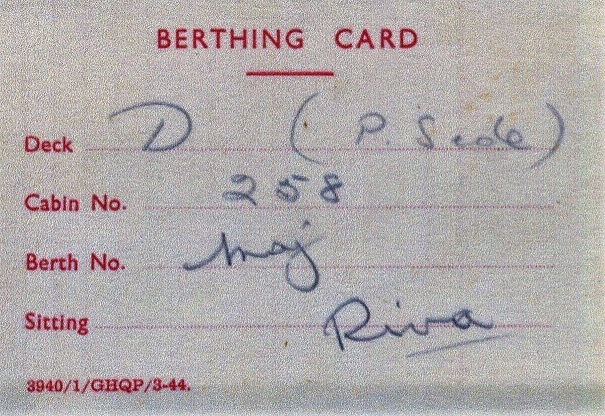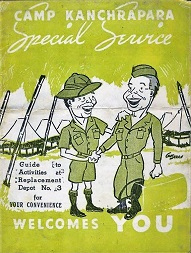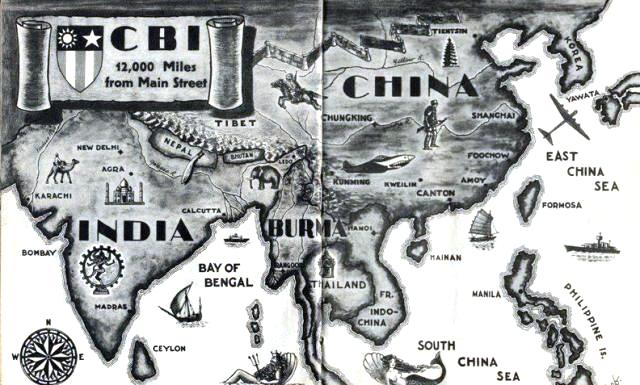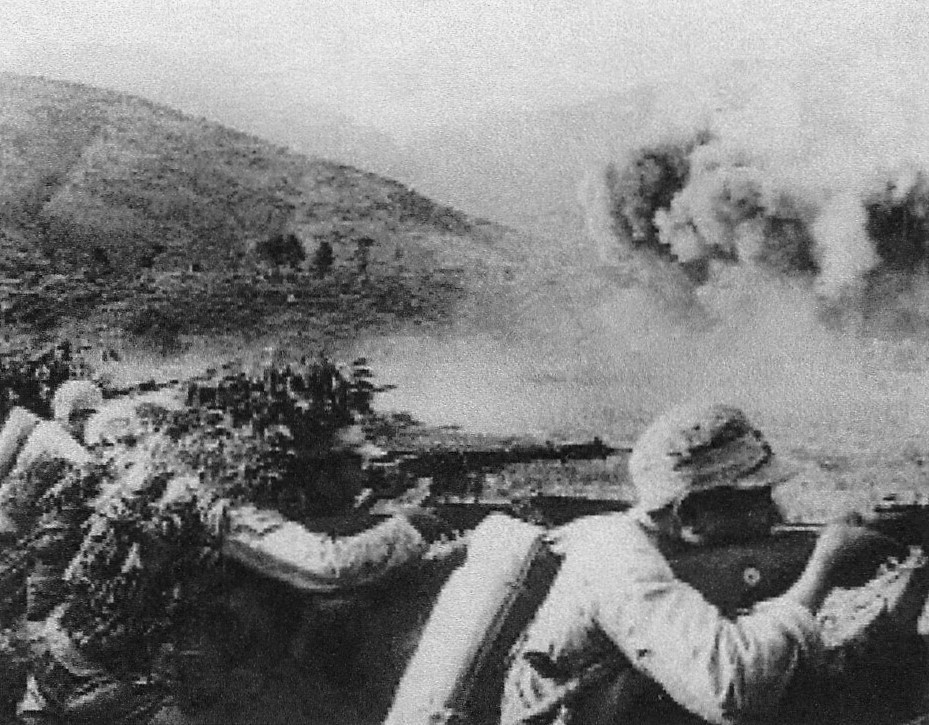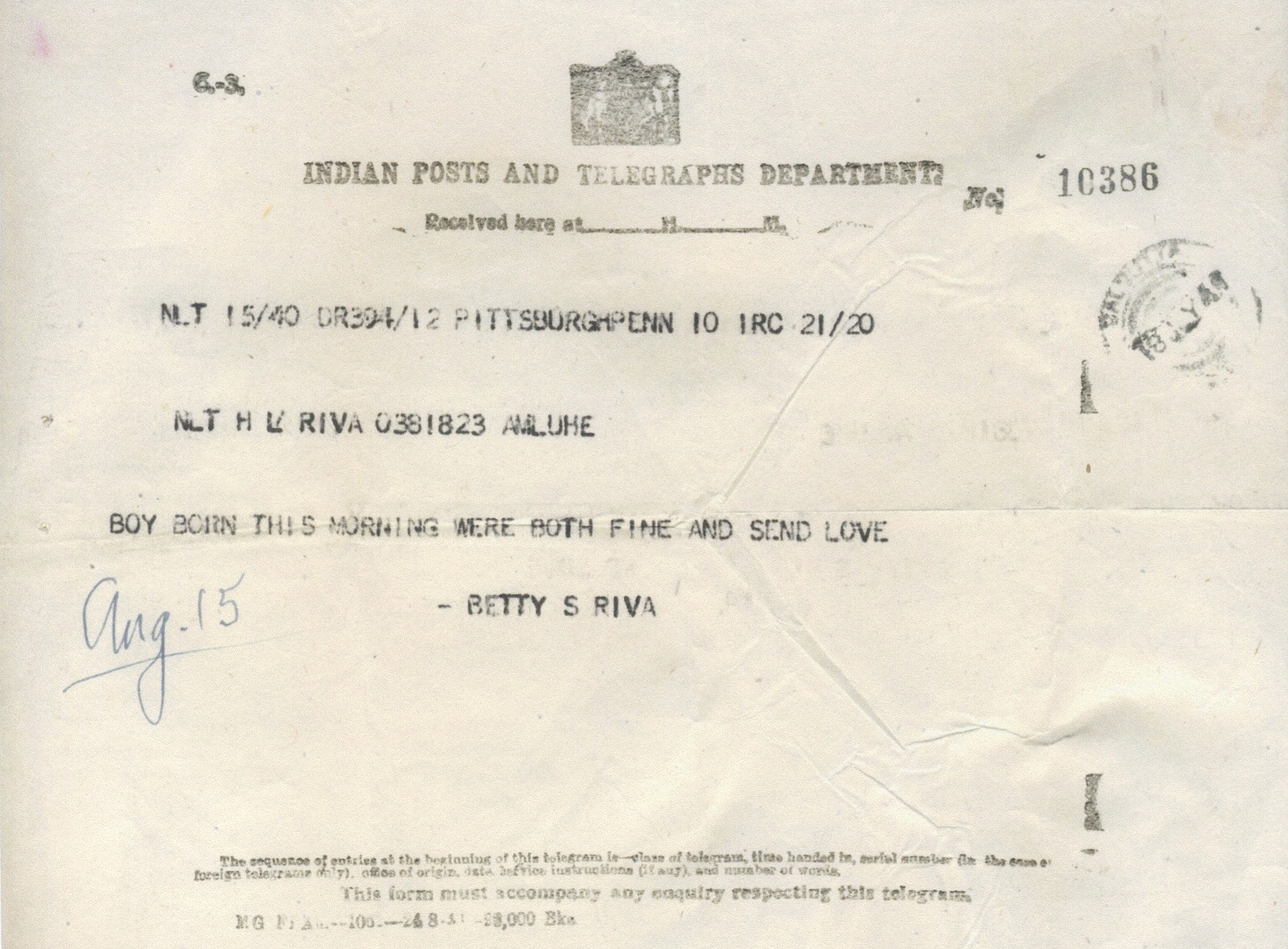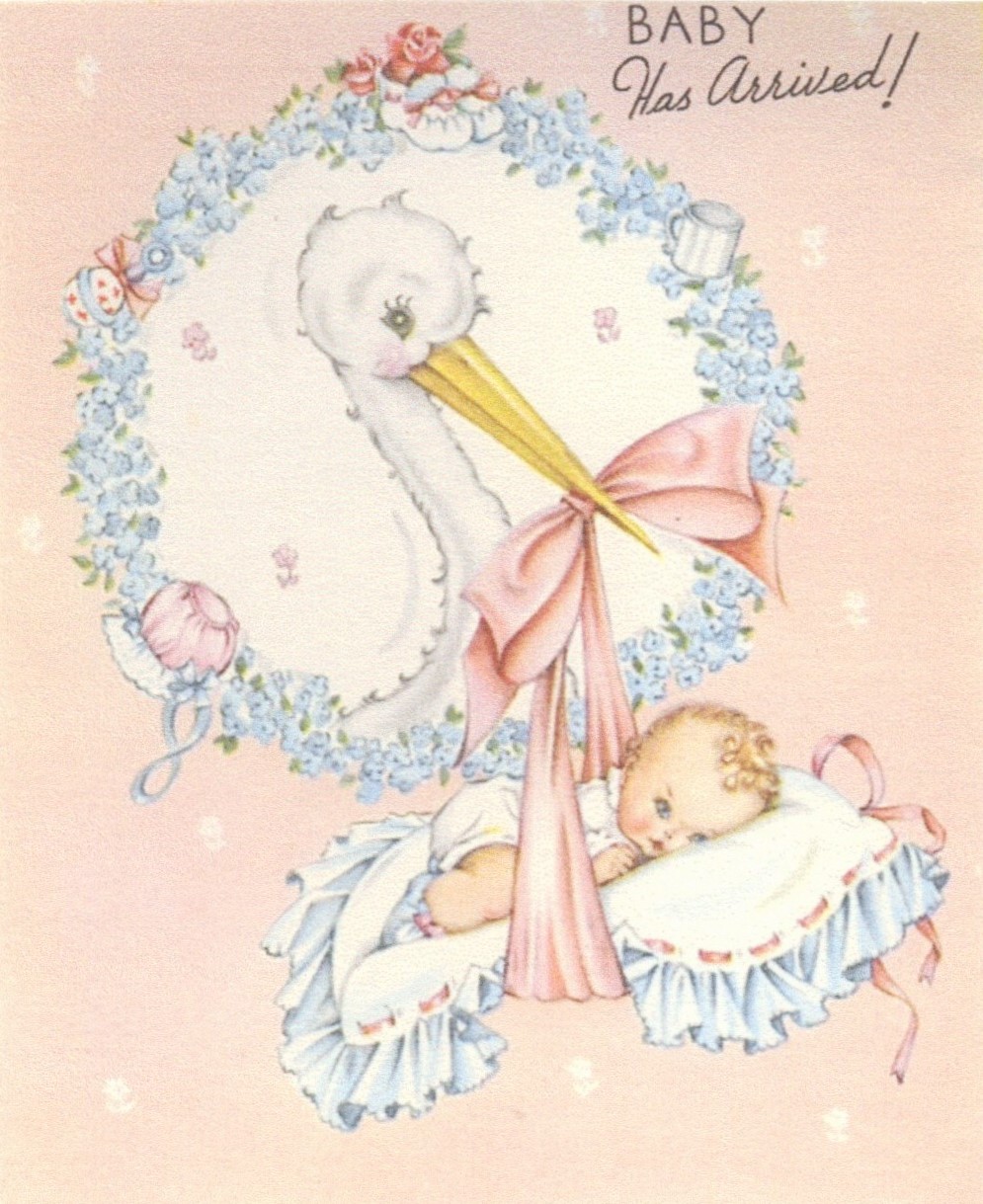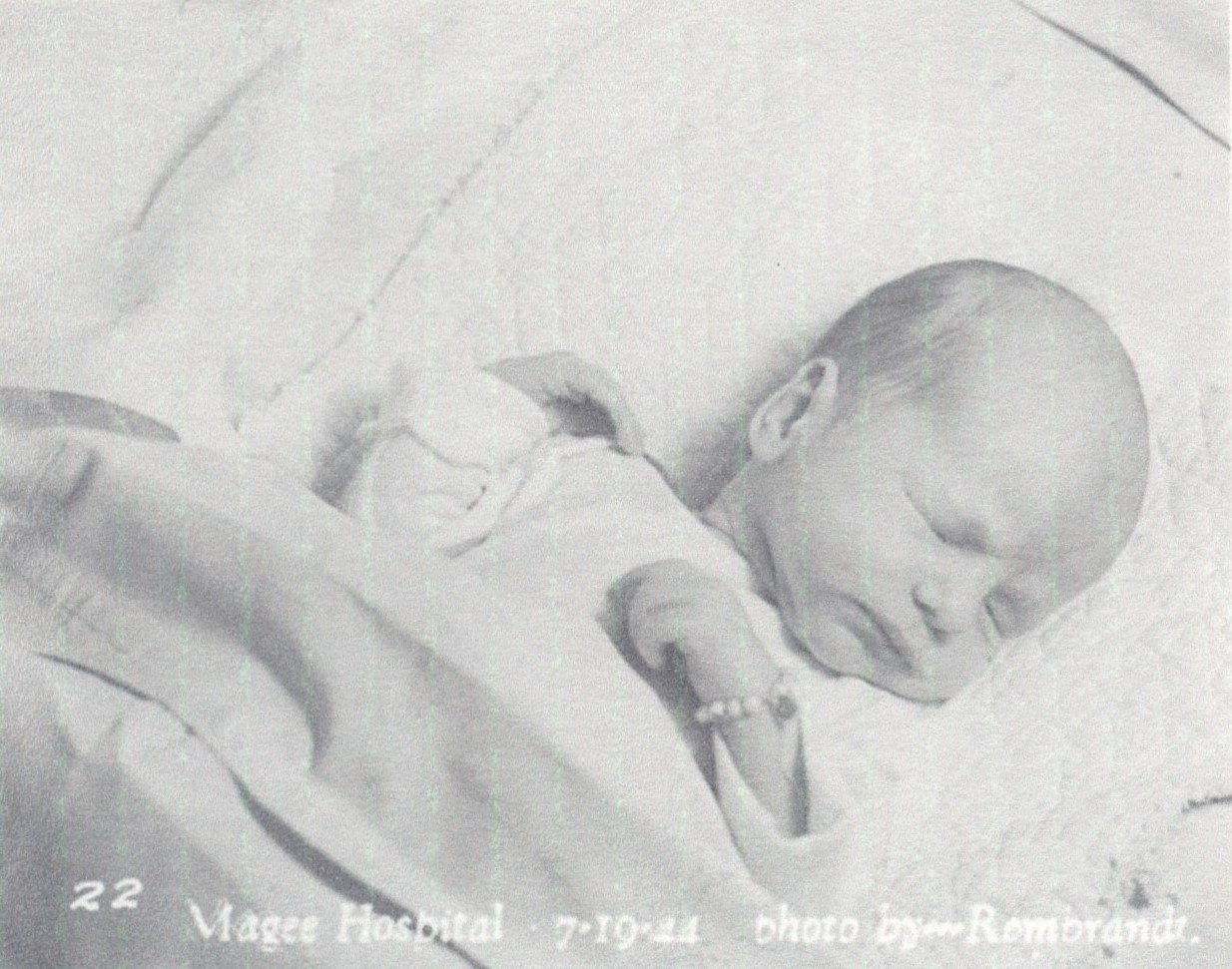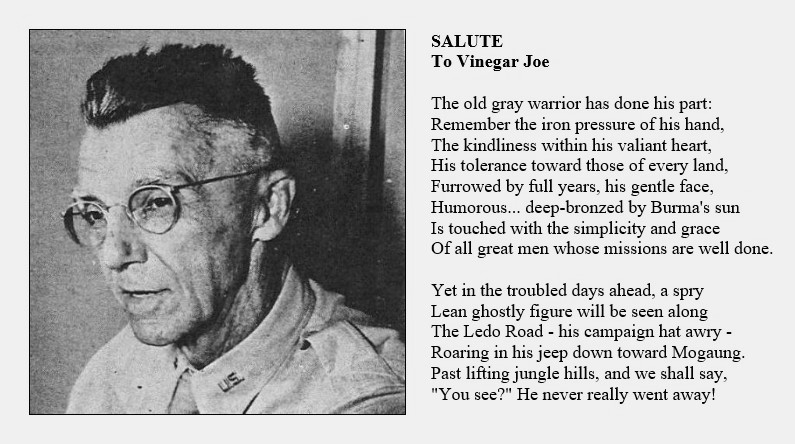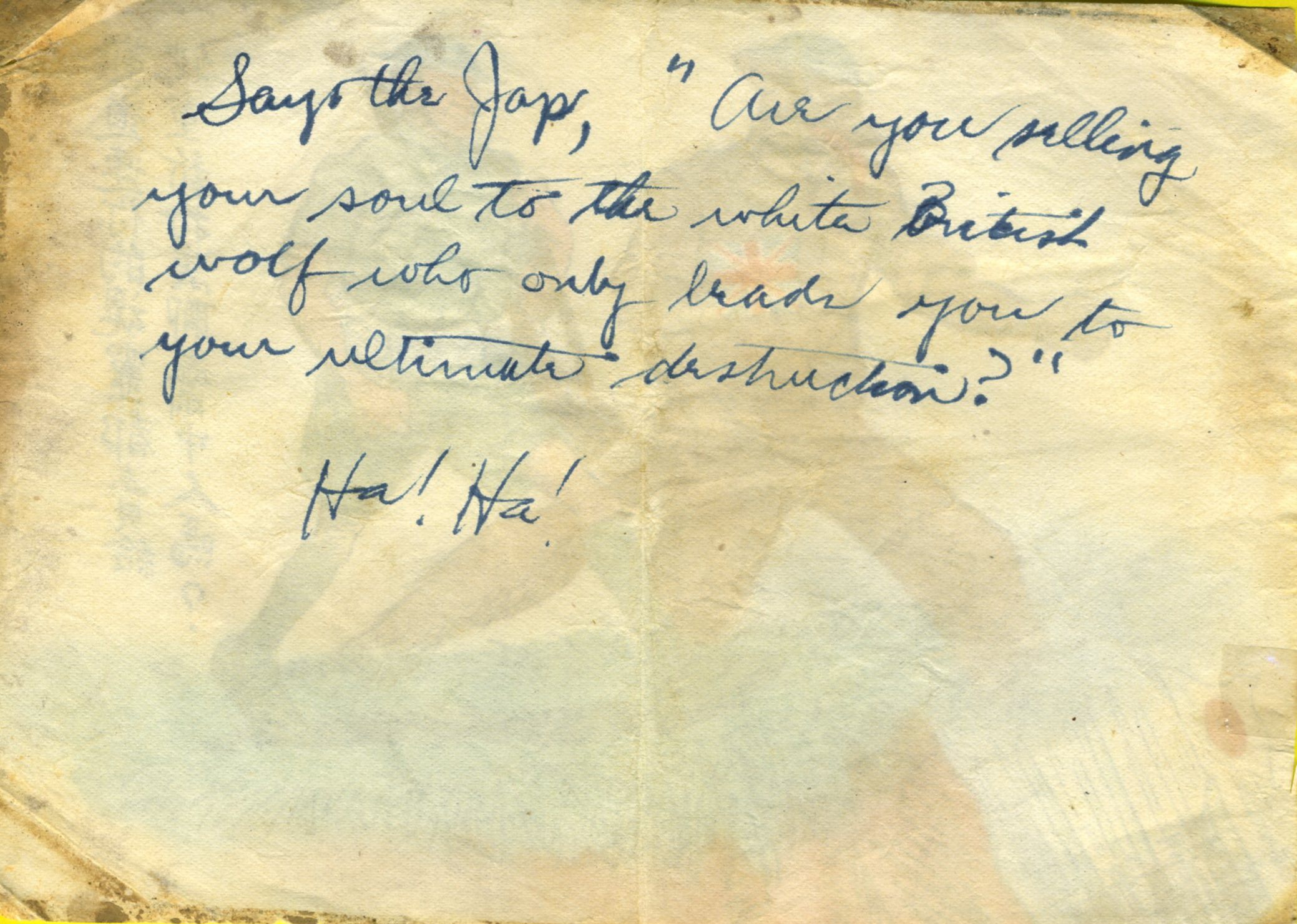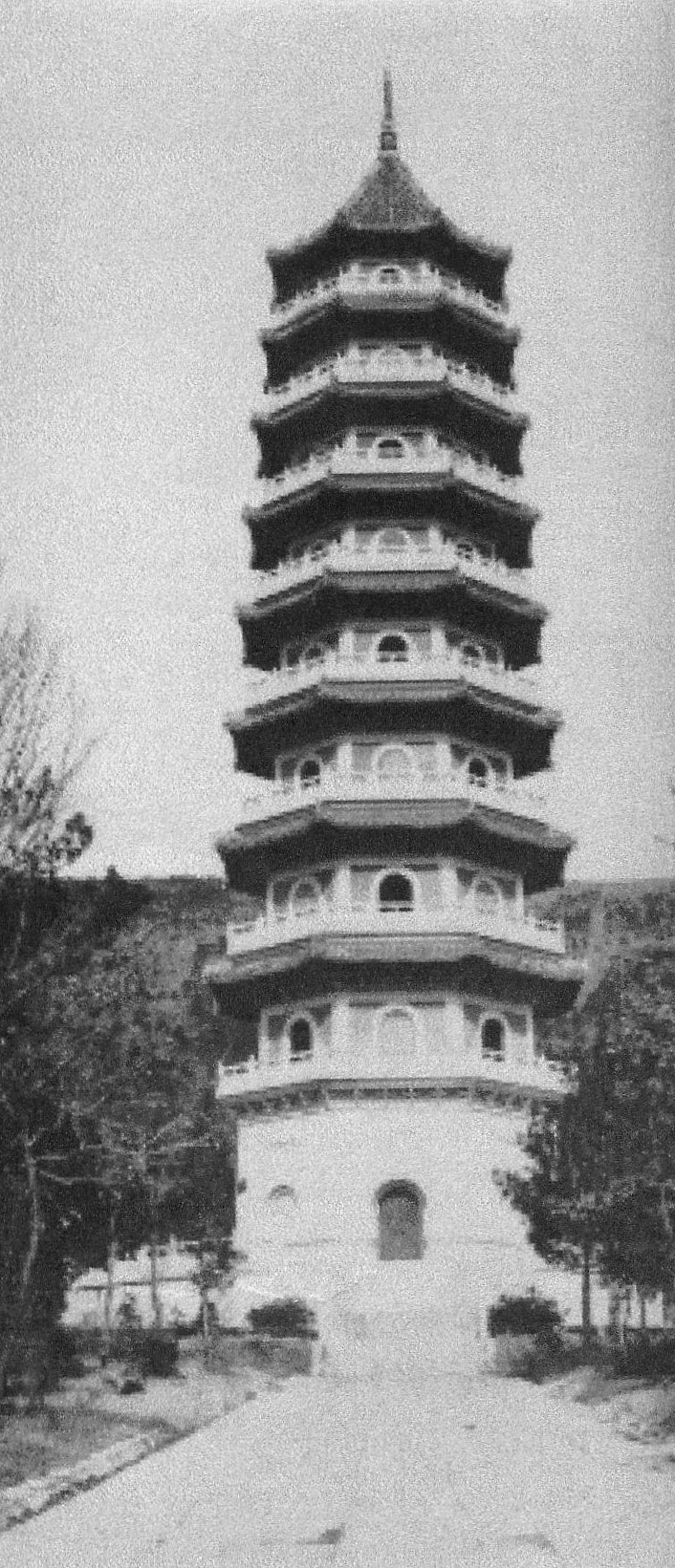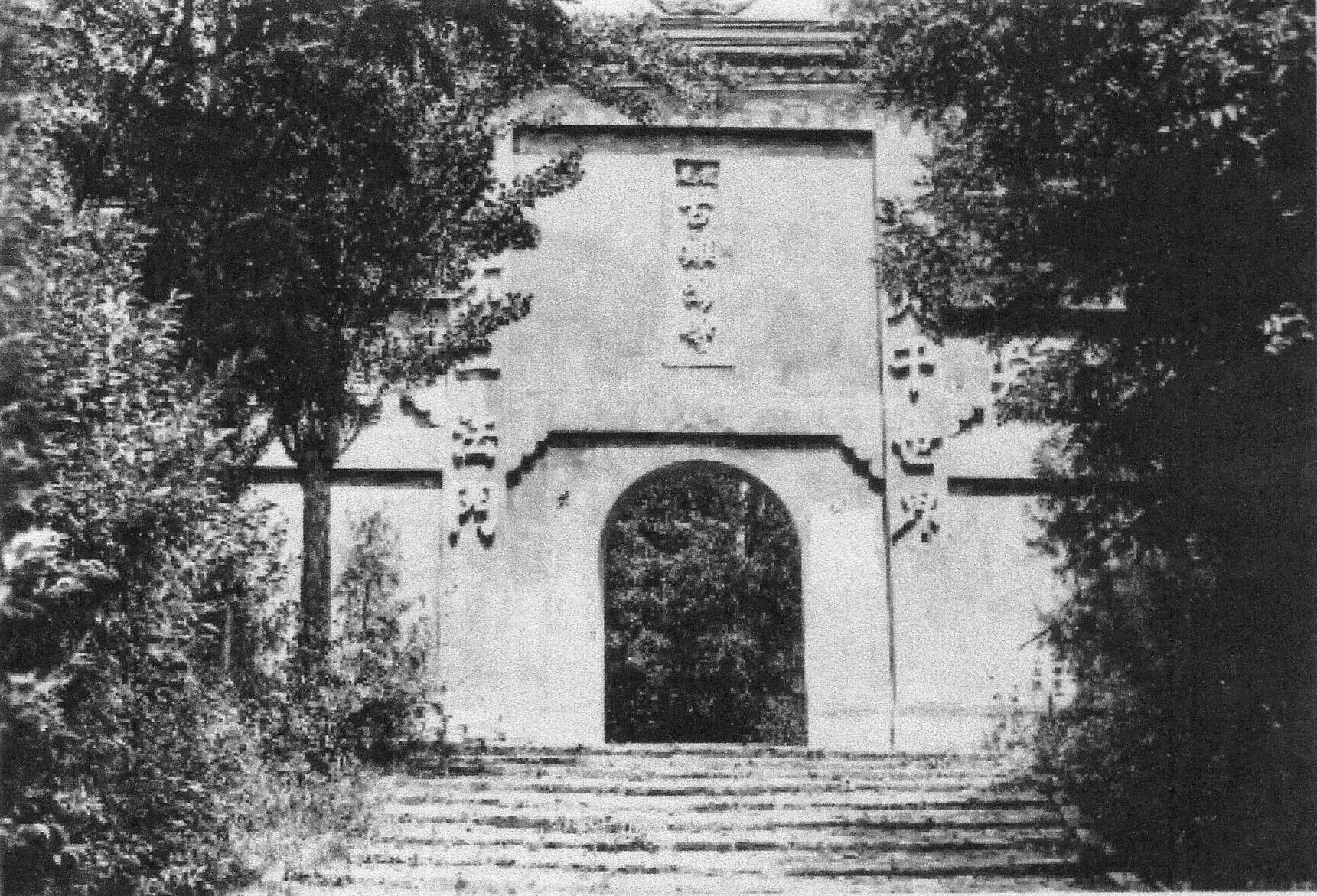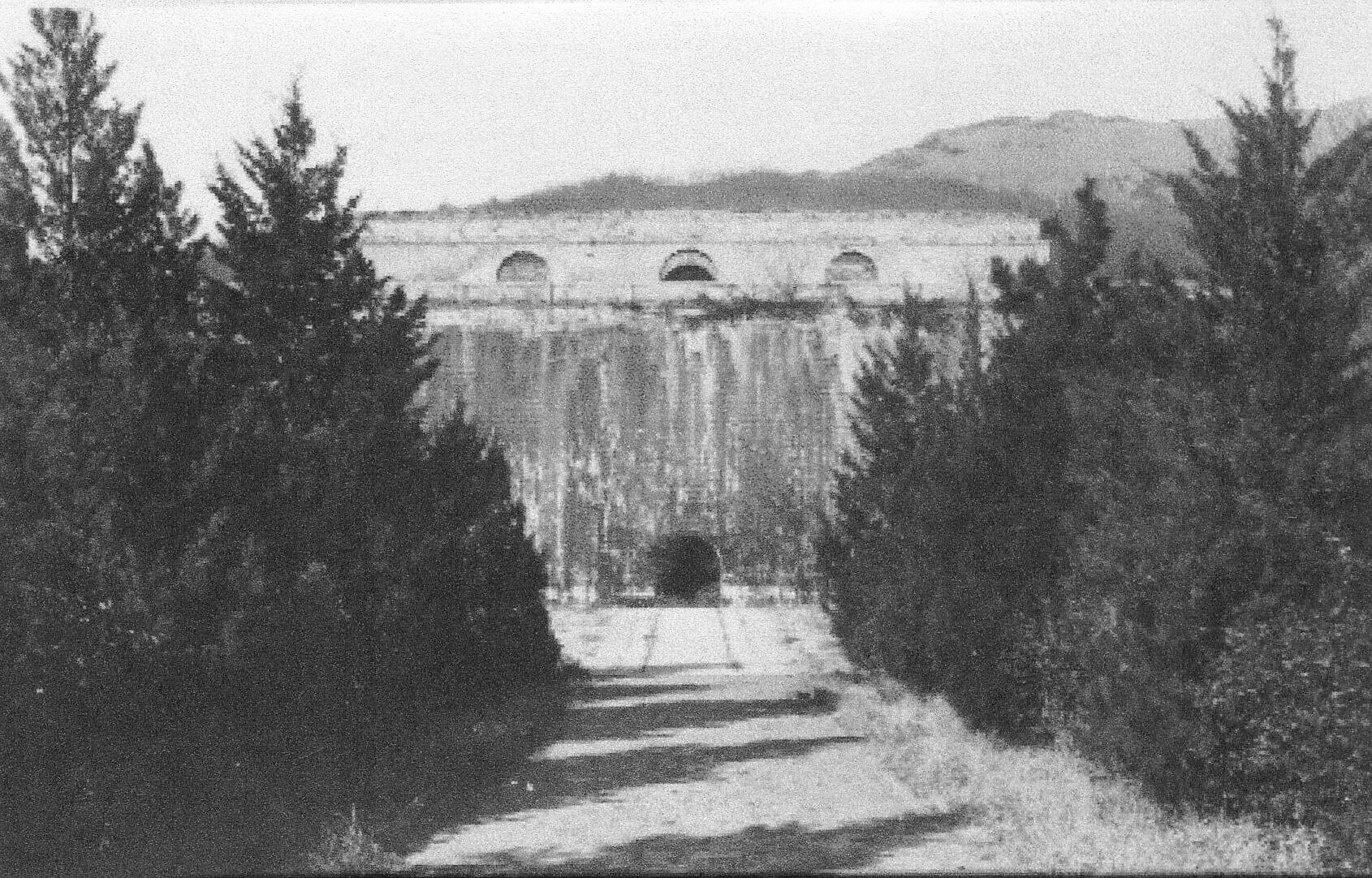|
Maj. H. L. Riva, MC, Surgeon
|
My Dearest 
We were told that censorship is now lifted but to avoid criticism of allies, I thought I'd take this opportunity of telling you
beforehand a little about the past 17 months, a lot of which you already know. However, this resume may answer some of your questions to come.
We left Hampton Roads on a Liberty Ship (U.S.S. William A. Graham - Hull No. 160) part of UGS-37 convoy from United States to Gibraltar
on April 11th but didn't leave the harbor until the 13th. I had the nicest room and bunk of all the Army passengers, of course, the Navy gun crew
and the Transportation Corps really had the nice quarters for a Liberty ship. Oddly enough, when I awakened on the morning of the 12th, I knew I was
going to get seasick. The boat seemed to be rocking and the splashing of the sea water against the thin sheeting of the hull, gave me an uneasy feeling.
Much to my amazement on reaching topside, I learned we had been anchored out a ways from the dock all night and the ship wasn't stirring in the calm
water one bit - great thing the imagination.
|
Liberty Ship U.S.S. William A. Graham
|
|
Hampton Roads Port of Embarkation
|
The men were jammed into holds. Meals were eagerly awaited by all and under the crowded conditions, it was
a wonder we didn't have an epidemic. It meant a lot of work and the strictest sanitary discipline. Bill Van Loan, Col. Edmunds (who later committed
suicide in India) and I made daily rounds. It was quite a convoy, over a hundred ships. The blackouts were eerie things. It was fun watching the lines
of ships going through various maneuvers. One could always tell when the destroyer escorts were dropping charges in one while we were below the deck -
an ominous "tick - tick" could be heard as though old Neptune were tapping on the hull with a pencil. This would be followed by the muffled explosion.
Big Navy patrol planes came out from the Bermudas to watch over us for two days. Then, we were on our own until we reached Gibraltar.
|
Journey of the 28th Portable Surgical Hospital through the Mediterranean
|
|
British Corvette Destroyer Escort
|
Then we watched our convoy leaving the other ships bound for Casablanca. Planes came out from Gibraltar to greet us and the British Corvettes
took over escort duty. Gibraltar surprised me. I thought it would be on my right, although, I knew it connected with the mountains. The Prudential
pictures fooled me I guess. It was good to see land again and the shoreline on either side was most picturesque, quaint coastal villages and towns and
the towering, rugged hills behind.
|
Some momentos of North Africa
|
That North African landing was no snap. We reached Oran on the 30th. We were driven to a staging area about a half hour out of town,
there to be processed.
I had a faint hope we were going to Italy, for on checking with Pud and Fish I learned thay had been shipped to Naples.
After spending about 11 days there, we embarked on the Orduna, a British liner and what a filthy tug.
|
British Troop Ship R.M.S. Orduna
|
The sunsets were gorgeous. Unfortunately, the cameras were always locked up while we were aboard ship.
We docked in Bombay overnight and the British
(nurses, WACs, etc.) had a torrid, sexual orgy by themselves, resulting in many court-martials the next day.
It was strictly a British party. We didn't get to visit Bombay but saw the blasted dock area supposedly sabotage of a week prior to our arrival.
We traveled across the country by rail, eating from a make shift mess and sleeping on the seats for six days and nights.
Those railcars are really something.
One of the most remarkable things I noticed were the different types of heat encountered as we passed from one area to another.
We arrived in Calcutta and we were sent to a staging area called Kanchrapara about an hour and a half from the city.
What a miserable hole that was: mosquitoes, insects and jackals and rain galore.
Calcutta was an interesting city- utterly filthy in some sections (The Black Hole of Calcutta) and picturesque in others.
Here the red tape and the indecision of the CBI Theater became apparent.
I began to have doubts about our assignment.
|
Indian Troop Train which ran on charcoal
|
Finally, we were ordered by train to Chabua.
This was a miserable six day jaunt which we had to arrange ourselves practically.
The British were hopeless.
Major Morris and I had to coerce, threaten and beg our train up the line.
The Indians have a habit of sidetracking everything.
Why we didn't get malaria on those train rides is more than I can answer.
The Brahmaputra was the strangest river I ever saw.
It had six currents in it going in different directions.
It was odd to see ferries struggle against them.
We saw British reinforcements going into battle at the Indian border.
We were thirty miles from the front then.
We reached Chabua one morning and entered China the following morning landing in Kunming.
|
China, Burma and India - The CBI Theater
|
The altitude is 6700 feet and without a doubt the most delightful all year round climate in China that we encountered.
Everyone remarked about this. We were only in Kunming a week when we left in some rickety trucks for the Salween Front.
The treacherous Burma Road was a huge disappointment and most disheartening for it was obvious that no major force could ever be supplied over it.
On the 4th day (June 5, 1944) we reached Paoshan, where Col. Fish and his 21st Field Hospital were located.
|
Entrance to the 21st Field Hospital outside Paoshan, China.
|
|
T/5 Robert Kingston, Maj. Robert E. Pennington, Lt. E. Boyd (seated) and T/5 Joseph H. Hill operating on Chinese soldier on Salween Front.
|
They proved to be our finest friends in China. We were to stay with the 21st but Maj. Fox of the 36th pulled a fast trick so that the next day
found us at the Salween Gorge. The latter was frightening. The road to the bridge was precipitous and precarious. Destroyed vehicles and weapons lined
the narrow and tortuous trail and gave us our first true glimpse of frontal warfare. Across the gorge lay the Japs in their mountain redoubt -
an impregnable mountain fortress. Humanity and the military in all its ugliness was at the malodorous, congested area on the east side of the
Salween River.
|
Salween Offensive 1 April 1944 - 27 January 1945
After the Chinese-American-Kachin force captured Myitkyina, Burma, Chiang Kai-shek finally gave his approval for launching an offensive in
Yunnan Province, China. 72,000 Chinese soldiers organized in 12 divisions under the command of General Wei Li-huang attacked the under strength
Japanese 56th Infantry Division, which had little more than 11,000 men, north and east of the Salween River.
In late May, the Japanese garrison at Tengchung was wiped out. On 10 June, Chinese troops captured Lungling, which was a strategic location for the
eventual re-opening of the Burma Road, but a Japanese counterattack recaptured the town a week later. The 56th Division held on against the 300-kilometer
front until late June 1944 before withdrawing forward positions. Lungling was again captured by the Chinese by the end of August 1944. The Japanese
were then reinforced by a division and mounted a counterattack to halt the Chinese advance. In November 1944, the Chinese renewed their attacks,
taking Mangshih on 20 November, Mengka on 24 November, Chefang on 1 December and wanting on 20 January 1945. The Chinese pushed across the Burmese border
on 22 January.
Salween Offensive Timeline
|
11 May 1944 Chinese troops crossed the Salween River in Burma |
|
10 Jun 1944 Chinese troops captured Lungling, Yunnan Province, China |
|
20 Nov 1944 Chinese troops captured Mangshih, Yunnan Province, China |
|
24 Nov 1944 Chinese troops captured Mengka, Yunnan Province, China |
|
01 Dec 1944 Chinese troops captured Chefang, Yunnan Province, China |
|
20 Jan 1945 Chinese troops captured Wanting, Yunnan Province, China |
22 Jan 1945 By this date, all Japanese troops in Yunnan were pushed
to the Burma side of the China-Burma border |
|
No one knew who we were or where we were to go. There wasn't a suitable spot to bivouac, so we slept along the road while the artillery
dampened our ardor all the more with the thundering reverberations all night. Next day we found the only spot and set up. We hacked at the wrecked vehicles
for firewood and lumber to build benches and tables and to set up our hammocks. We had to take a 14 mile round trip to get water, for the river was
grossly contaminated by the Chinese. The old story was that one could always trail the Chinese by the flies and the feces. It was at this site I learned of
Dick's birth. And was I relieved.
|
Telegram informing Maj. Riva of his son's birth
|
I then went back to the 21st for my appendectomy.
It was then that the unit was bombed twice, while at the bridge. We had seen Zeros over before I had my attack. We were anticipating a move across the bridge which was still under construction. Pud moved the unit out at night to a site which was shelled for several weeks, ending about the time I returned at which time Sunshan Mountain finally fell, a couple hundred Japs having been killed or wounded over a division of Chinese - wholesale slaughter, the Chinese ignored American advice time and time again. While at the 21st, we had an air raid and I witnessed a real battle from a slit trench.
We left Sunshan then and headed for Tapa where, we were swamped with casualties from the battle of Lungling and Mangshih. We lived in Jap revetment buildings. Gad, it was cold there. I had a severe case of contact dermatitis of the hands there and acute sinusitis. Gen. Dorn had seen our places before we came to Tapa and was well pleased. Our work at Tapa was praised by Col. Hansen, the area surgeon. We left Tapa for the lovely Mangshi Valley, where we received casualties from the battle of Chefang. The Bahi's were an interesting tribe. The bamboo groves were unusual. There isn't anything one can't do with bamboo from burning it to using it for matting.
|
Junction of the Ledo and Burma Roads at Wanting, China. The combined roads were renamed in honor of Gen. Stilwell. MORE HERE
|
We left for the Chefang Valley, where we had a beautiful
site overlooking the Nahmkam River. Our site, organization and work was praised by Lt. Col. Uedner, the Assistant Theater Surgeon, Col. Cavanaugh
and SOS Surgeon Maj. Thomas. We ran a Chinese unit at the border town of Wanting and there we witnessed the historic opening of the Stilwell Road
and watched the first convoy roll by.
|
Written by CBI Correspondent/Poet Smith Dawless. MORE HERE
|
|
Capt. Joseph V. Fisher and Sgt. Richard Strack of the 28th at signs in English and Chinese commemorating the passing of the first convoy. MORE HERE
|
On the 6th of February we left the Chefang Valley by truck for Kunming. Just shortly before this,
the 4th Force Surgeon, decreed that our unit above all other Portables in the Salween, could stand the loss of one officer to bolster another Portable
which was falling apart. Hence, we lost Pud, a fine officer, surgeon and friend, the best of the three in my overseas tour thus far. Dunbar left for
OCS at this time. The unit was tired after seven grueling months and dispirited with the loss of Pud and Dunbar.
On our arrival back in Kunming, we found the whole China setup had changed. We were disheartened. I expected at least some mention of the unit's fine
work other than a few kind words. We were reorganized at Kunming with the unit cut to 24 men resulting in several long faces and stifled accusations.
Comer was the most selfish and I was counting on him to fill Dunbar's shoes. Rainey proved to ba an ass, Faust was disgusting, Oeatch became money-mad, Grant almost lost
his mind over the bombings and shelling. However, we pulled together and left for Kweiyang by road, picking up Smiley at Chanyi where Harry Geyer
was stationed, incidentally.
We passed historic waterfalls and the famous "steps" leading up the Annan Mountain. I met a partial Waterloo at Kweiyang.
After setting up a grand unit at Huachi, Col. Powell, the surgeon and I disagreed on a number of points which later proved to be his undoing. Interim,
he got Gen. Boye on me and I was relieved. I spent a rough month in the field with the 94th Army, fighting the Japs at Wukang in the battle of Chihkiang.
Japanese propaganda aimed at the Chinese against the British. Comments and translation are written on the back of the card:
Says the Jap, "Are you selling your soul to the white British wolf who only leads you to your ultimate destruction?" Ha! Ha!
|
I was called back by Col. Birk for an investigation of my relief from duty after Gen. McClure had given the unit a Letter of Citation and
Theater representatives praised our work and setup. I flew from Chihkiang to Kunming where the case was written up. I was ordered back to the unit
and to move it to the Chihkiang front out of Gen. Boye's command. I no sooner reached Chihkiang when I was given a radio to report back to Kunming
and the Eastern Command. I thought I was going home.
I flew back only to learn that I was to leave the unit as they couldn't "slap" a General's face (Boye) and let me remain with my unit
even though it was an error in his judgment and I was completely exonerrated otherwise I was given a choice of several administrative jobs with a
promotion or a professional job with a Station Hospital. I showed my hand and stated that a full reinstatement meant return to the 28th, as CO plus
a clearance of my record, otherwise I felt I had been done an injustice and would resign my Commision as an RA (Regular Army) immediately and continue
for the duration as an AUS (draftee) officer. I stated that unfortunately the affair had even reached you and how upset you must have been. The next day,
Gen. McClure spoke to me and gave me the okay to return to the unit. Gen. Boye lost face. My only regret is that Gabe didn't get a promotion.
I then returned to the unit at Chihkiang. We then proceeded to Tunkow on the road to Paoching. Gabe, Fish and his unit walked to Wukang.
The peace was then announced. We were alerted tp care for prisoners of war.
That fell through and we were attached to the new 6th Army and are to go to Nanking.
Scenes from Nanking, China 1945
|
I hope to be home by Christmas. If not, I'll be sorely disappointed. I want 30 days off, then back to a General Hospital for a checkup and if we stay in for a while,
I'll ask for duty either in Texas, California or New York City to look the field over. If they give me a bum deal, you and I alone---! Well, love,
I hope I could have told you all of this before, but this is war. I'll fill in the details later from my letters and diary. ♦
